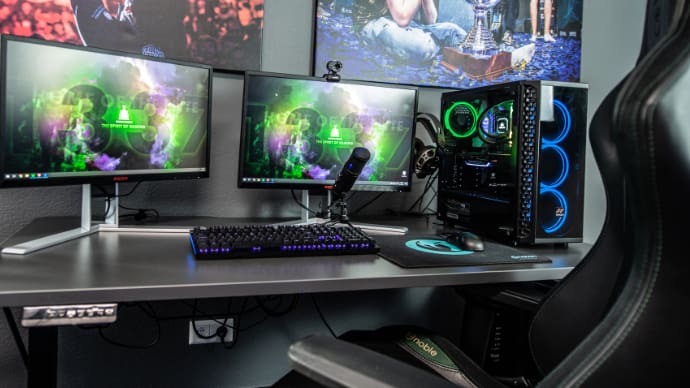And if you can’t build one yourself, then you should at least opt for a pre-built gaming desktop instead of a gaming laptop. Traditionally, this was the best way to save money while maximizing performance. But in recent years, global supply chain issues and the increasing value of GPUs to cryptocurrency enthusiasts has wreaked havoc on this line of thinking. Graphics cards are difficult to get, and when you do find them, they’re exceedingly expensive. Is it still a better value to stick with gaming desktop PCs? Or is it time to admit that gaming laptops are the right way to go? Here’s what you need to know about gaming PCs vs. laptops now.
What Are the Benefits of a Gaming Desktop?
There are obvious benefits to a gaming desktop that most gamers know about, including ease of upgrading individual components, greater modularity for hardware choices, and better hardware overall. But other gaming desktop benefits are not-so-obvious. A gaming PC is considerably larger than a laptop. While that does mean it’s heavier and takes up more space, it also means more room for air to circulate—or the option to install a water-cooling system. If you hate fan noise, this is the best way to go. With a desktop gaming PC, you can easily upgrade RAM, your graphics card, and even your CPU. With a laptop, you might be able to add memory or install a better SSD, but that’s as far as you can go. Then there are hardware peripherals to consider. On a laptop, you’re pretty much stuck with it unless you deal with the hassle of an external keyboard (defeating the purpose of a laptop). With a desktop, you can dabble in mechanical keyboards, trackballs, and more. And gaming performance isn’t all there is to it. For some people (myself included), part of the fun is the PC build process. Picking the right parts and putting them together is part of the hobby. A gaming laptop is a fast-forward button that skips all of that enjoyment.
What Are the Benefits of a Gaming Laptop?
The biggest benefit of a gaming laptop is that it arrives fully assembled and ready to use with very little hassle. Not everyone wants to build or maintain a PC, and upgrades can be expensive. Thanks to the global chip shortage, desktop PC parts are harder to find right now. As demand skyrockets and supply continues to choke, prices have been going up and up. This is a huge roadblock for anyone who wants to build their own gaming PC, this year and beyond. Laptop manufacturers can buy parts by the thousand, which lets them acquire at lower prices. Laptop-specific parts are also less desirable for crypto fanatics, which helps keep gaming laptop prices more affordable than comparable gaming desktop PCs right now. And don’t forget: gaming laptops have gotten much better in the past decade. Not only are they sleeker than they used to be, they’re performant and great for everyday use. Gaming laptops like the ASUS ROG Zephyrus G15 are fantastic all-in-one options. Of course, it’s not all about price. If you want to game on the move, a laptop is obviously the better option. Sure, you can carry your PC around—people used to do it all the time—but it’s far from easy or enjoyable. With a laptop, any flat surface is fair game. As someone who has traditionally been laptop-averse for gaming, I admit that there’s something strangely soothing about playing Final Fantasy XIV on my living room table than the desk in my home office. Maybe you don’t have a home office or any other dedicated space to place a desktop PC. In that case, not only is a gaming laptop your best option, it might be your only option.
Gaming Laptop or Gaming PC: The Verdict
Right now, if you need to buy a new machine soon and you want to start gaming on it as quickly as possible, a gaming laptop is your best bet. It’s the more economical choice given current world circumstances, and there’s no way to know when the situation will improve. If you enjoy building PCs, you’re never going to love your laptop the same way you would a desktop PC. You’ll definitely end up spending more money, but if you can afford it, that satisfaction may be worth it—as long as you’re quick enough to snag a component when it’s available. If you can wait a few years to see how the gaming PC economy evolves, that might be for the best. You don’t need a great PC or laptop to play quality games, as we’ve shown before: Read next: The best lightweight games for non-gaming PCs





